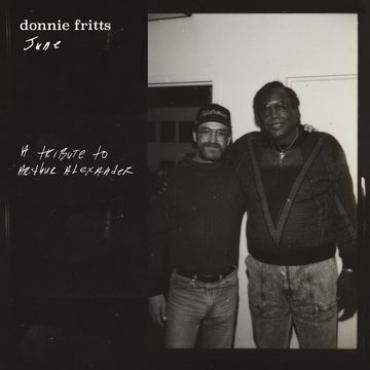
Arthur Alexander’s soul classic “You Better Move On” put a tiny little Alabama town and recording studio on the musical map for eternity. As Donnie Fritts reminds us, “It was the first R&B hit to come out of the Muscle Shoals area; groups like the Rolling Stones and the Beatles loved June’s songs.” The Stones released their own version of “You Better Move On” in the US on December’s Children.
Donnie Fritts grew up with Alexander: “we were such close friends. It was in the 1950s; I was 16 and he was 18, and we hung around together all the time, which was kind of unusual at that time in Alabama, a white kid and a black kid hanging around together.” Music and songwriting bound the two friends together, and they were always helping each other take that next step in the musical landscape. “I was involved already with a little publishing company,” Fritts recalls, “and so I had Arthur come in an audition for us one day, and we loved him. All the time we were together he encouraged me to write; we went through a lot of things.”
Fritts was at Alexander’s hospital bedside when the singer died in 1993. Feeling bereft following his friend’s death, Fritts drove back to the Shoals and wrote the lyrics to “June” in remembrance of Alexander. “I wrote it the day he died. On the way back from Nashville to Muscle Shoals, I was very sad. Even though I wrote the lyrics that day, I could never find a melody I was happy with. Just recently I thought, ‘I’m gonna write this as a 6/8 soul ballad,’ and that feels right.”
The title track of this new tribute album, June, for Alexander praises the great man for his loyal friendship through the good bad times, through the lean years, through the challenges they faced as friends in a South that didn’t accept their friendship easily, or at all, and through the years of making music together. Fritts lovingly celebrates his talented friend in the opening lines of the song: “Well, I met him when I was only sixteen/We could not believe how the big man could sing/And to our surprise he wrote his own tunes/Oh, what a talent, the man we call ‘June’.”
Fritts’ moving album features a number of songs that he and Alexander co-wrote, including the gospel shouter “Thank God He Came.” Fritts recalls the night they wrote that song: “One night we were writing and we’d never written a gospel song. He was a very religiously-minded guy. It really bothered him that he was singing about God and Jesus and making money off it. I tried to convince him that the song might inspire others, but he never got over that feeling.” In Fritts’ sure voice, the song powerfully moves on up, and the backing chorus showers us with sparks of inspiration.
Fritts, backed on this album by John Paul White on guitar and vocals, David Hood on bass, Ben Tanner on keyboards, Reed Watson on drums, Kelvin Holly on electric guitar, Kimi Samson on violin, Caleb Elliott on cello, and Laura and Lydia Rodgers on harmonies, turns in his own funky version of “You Better Move On.” “You Can Come Along with Me,” an Alexander-Fritts co-write that appears on Alexander’s 1972 self-titled album, captures the aching heart of the tentativeness of a new relationship; the song opens sparely with Fritts’ gravely vocals over his piano before it opens into a soul ballad. The Latin-flavored “Lonely Just Like Me” has the seeds in it of Warren Zevon’s later “Carmelita.” The album closes with the gospel-drenched piano and harmonies of the autobiographical “Adios Amigo” (also the title of the 1994 tribute album to Alexander): “Talking about how we kind of grew up together/where we would go we would go as one/when one of us got hurt/the other would cry.”
June offers a poignant tribute to one of our greatest singers and writers by a great singer and writer who continues to miss his friend and to be influenced by him and his music. As Fritts says, Alexander was “very smart and a very amazing talent,” and June praises that talent with a gift of superlative music.




